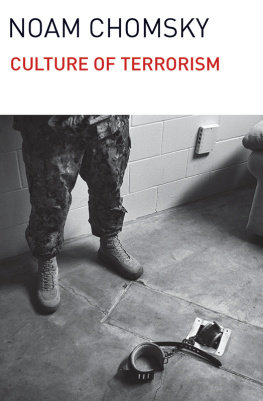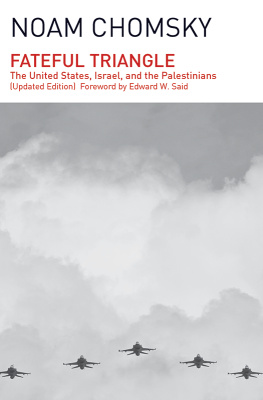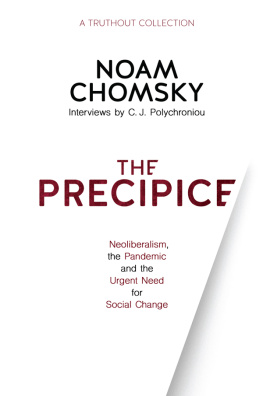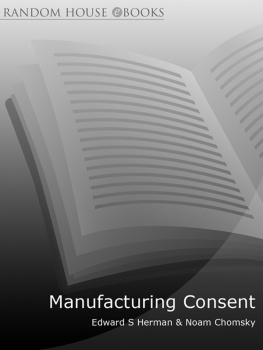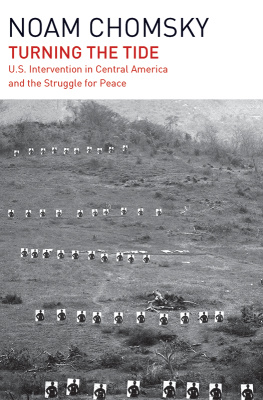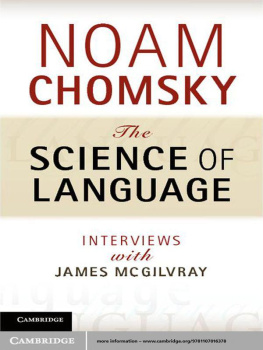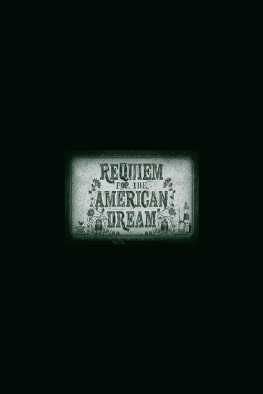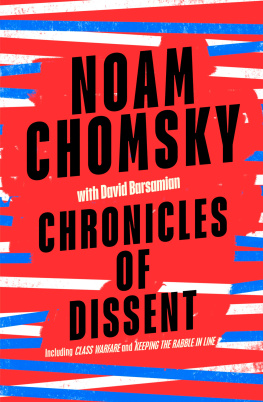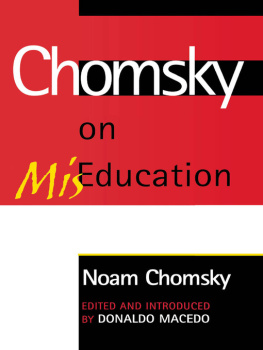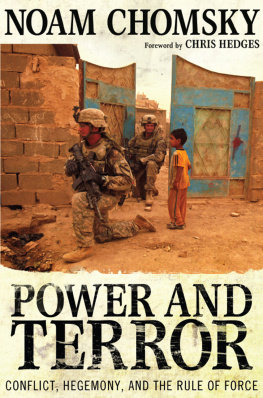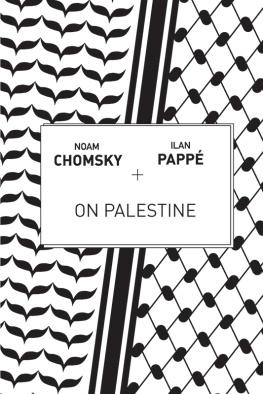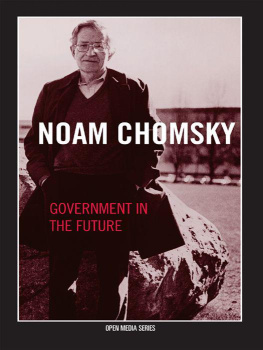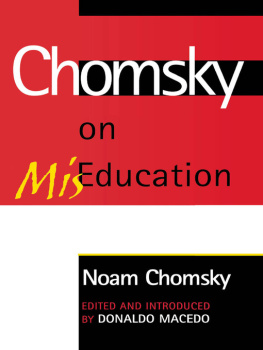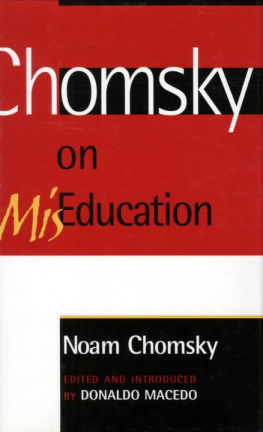Noam Chomsky - Culture of Terrorism
Here you can read online Noam Chomsky - Culture of Terrorism full text of the book (entire story) in english for free. Download pdf and epub, get meaning, cover and reviews about this ebook. City: Chicago, Illinois, year: 2015, publisher: Haymarket Books, genre: Politics. Description of the work, (preface) as well as reviews are available. Best literature library LitArk.com created for fans of good reading and offers a wide selection of genres:
Romance novel
Science fiction
Adventure
Detective
Science
History
Home and family
Prose
Art
Politics
Computer
Non-fiction
Religion
Business
Children
Humor
Choose a favorite category and find really read worthwhile books. Enjoy immersion in the world of imagination, feel the emotions of the characters or learn something new for yourself, make an fascinating discovery.
- Book:Culture of Terrorism
- Author:
- Publisher:Haymarket Books
- Genre:
- Year:2015
- City:Chicago, Illinois
- Rating:5 / 5
- Favourites:Add to favourites
- Your mark:
- 100
- 1
- 2
- 3
- 4
- 5
Culture of Terrorism: summary, description and annotation
We offer to read an annotation, description, summary or preface (depends on what the author of the book "Culture of Terrorism" wrote himself). If you haven't found the necessary information about the book — write in the comments, we will try to find it.
Culture of Terrorism — read online for free the complete book (whole text) full work
Below is the text of the book, divided by pages. System saving the place of the last page read, allows you to conveniently read the book "Culture of Terrorism" online for free, without having to search again every time where you left off. Put a bookmark, and you can go to the page where you finished reading at any time.
Font size:
Interval:
Bookmark:
Contents
Preface
This essay on the culture of terrorism is based on a December 1986 postscript for several foreign editions of my book Turning the Tide . I had originally intended to update the same material for a new U.S. edition, carrying it through the Iran-contra hearings, but it took on a rather different character in the course of rewriting, so I have prepared it for separate publication. I will, however, generally assume the discussion in Turning the Tide and the further elaboration in On Power and Ideology as background, without specific reference.
This earlier material dealt with several topics: the travail of Central America; the principles that underlie U.S. policy planning as revealed by the documentary record; the application of these principles in Third World intervention, primarily with regard to Central America and the Caribbean; the application of the same principles to national security affairs and interactions among the industrial powers; and some relevant features of domestic U.S. society. The centraland not very surprising conclusion that emerges from the documentary and historical record is that U.S. international and security policy, rooted in the structure of power in the domestic society, has as its primary goal the preservation of what we might call the Fifth Freedom, understood crudely but with a fair degree of accuracy as the freedom to rob, to exploit and to dominate, to undertake any course of action to ensure that existing privilege is protected and advanced. This guiding principle was overlooked when Franklin Delano Roosevelt announced the Four Freedoms that the U.S. and its allies would uphold in the conflict with fascism: freedom of speech, freedom of worship, freedom from want, and freedom from fear.
The internal documentary record of U.S. planning and, more importantly, the unfolding historical events themselves yield ample evidence to evaluate the significance attached to the Four Freedoms in doctrine and in practice, and to demonstrate their subordination to the Fifth Freedom, the operative principle that accounts for a substantial part of what the U.S. government does in the world. When the Four Freedoms are perceived to be incompatible with the Fifth, a regular occurrence, they are set aside with little notice or concern.
To pursue programs that are conceived and applied in these terms, the state must spin an elaborate web of illusion and deceit, with the cooperation of the ideological institutions that generally serve its interestsnot at all surprisingly, given the distribution of domestic wealth and power and the natural workings of the free market of ideas functioning within these constraints. They must present the facts of current history in a proper light, conducting exercises of historical engineering, to use the term devised by American historians who offered their services to President Wilson during World War I: explaining the issues of the war that we might the better win it, whatever the facts may actually be. It has commonly been understood that the responsibility of the serious academic historian and political scientist, as of political leaders, is to deceive the public, for their own good. Thus the respected historian Thomas Bailey explained in 1948 that Because the masses are notoriously short-sighted and generally cannot see danger until it is at their throats, our statesmen are forced to deceive them into an awareness of their own long-run interests, a view recently endorsed by the director of Harvard Universitys Center of International Affairs, Samuel Huntington, who wrote in 1981 that you may have to sell [intervention or other military action] in such a way as to create the misimpression that it is the Soviet Union that you are fighting. That is what the United States has done ever since the Truman Doctrine. An accurate assessment, which applies very aptly to Central America today. The academic world too must be rallied to the cause. In his presidential address to the American Historical Association in 1949, Conyers Read explained that
we must clearly assume a militant attitude if we are to survive.... Discipline is the essential prerequisite of every effective army whether it march under the Stars and Stripes or under the Hammer and Sickle... Total war, whether it be hot or cold, enlists everyone and calls upon everyone to assume his part. The historian is no freer from this obligation than the physicist... This sounds like the advocacy of one form of social control as against another. In short, it is.
In general, it is necessary to ensure that the domestic population remains largely inert, limited in the capacity to develop independent modes of thought and perception and to formulate and press effectively for alternative policieseven alternative institutional arrangementsthat might well be seen as preferable if the framework of ideology were to be challenged.
Subsequent events illustrate very well the theses developed in the earlier material to which I referred above. I will review a number of examples, including the scandals that erupted in late 1986 and their consequences, and the new demands that these developments posed for the ideological system. The scandals elicited a good deal of commentary and reflection on our political institutions and the way they function. Much of it, I think, is misguided, for reasons that I will try to explain as we proceed. My main concern will be to assess what we can learn about ourselves, particularly about the dominant intellectual culture and the values that guide it, from an inquiry into recent events and the reaction to them at a critical moment of American life.
Dedication to the Fifth Freedom is hardly a new form of social pathology. Nor, of course, was it an invention of the white hordes who, fortified in aggressive spirit by an arrogant, messianic Christianity and motivated by the lure of enriching plunder,...sallied forth from their western European homelands to explore, assault, loot, occupy, rule and exploit the rest of the world during the nearly six centuries when western Europe and its diaspora have been disturbing the peace of the worldas the advance of European civilization is perceived, not without reason, by a perceptive African commentator. But this vocation of the powerful constantly assumes new formsand new disguises, as the supportive culture passes through varying stages of moral cowardice and intellectual corruption.
As the latest inheritors of a grim tradition, we should at least have the integrity to look into the mirror without evasion. And when we do not like what we see, as we most definitely will not if we have the honesty to face reality, we have a far more serious moral responsibility, which should be obvious enough.
Cambridge, Massachusetts
October 1987
The Challenge
The scandals that erupted in the Fall of 1986 and the reaction to them cast a revealing light on the political system and the intellectual culture that interprets and sustains it. As we shall see in detail below, these events demonstrated that the United States remains dedicated to the rule of force, that political elites agree and indeed insist that it must remain so, and that, furthermore, the commitment to violence and lawlessness frames their self-image as well, barely concealed beneath deceptive rhetoric. These conclusions can readily be drawn from the actual record, if we face it honestly and without illusion. They have serious implications for the future, just as the same conclusions in earlier days, no less readily established, no less regularly suppressed, have had profound consequences in the past.
With regard to Central America, the scandals disrupted a tacit elite consensus, troubled by some tactical disagreements over generally shared goals. They imposed new demands for the ideological system, which must control the domestic damage and ensure that it is confined within narrow and politically meaningless bounds while dedicating itself anew to the major and continuing task: to fashion an appropriate version of the real scandals of the 1980s so as to place U.S. actions in a favorable light and thus to ensure that similar policies can proceed without serious impediment when they are considered necessary.
Next pageFont size:
Interval:
Bookmark:
Similar books «Culture of Terrorism»
Look at similar books to Culture of Terrorism. We have selected literature similar in name and meaning in the hope of providing readers with more options to find new, interesting, not yet read works.
Discussion, reviews of the book Culture of Terrorism and just readers' own opinions. Leave your comments, write what you think about the work, its meaning or the main characters. Specify what exactly you liked and what you didn't like, and why you think so.

